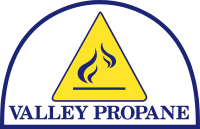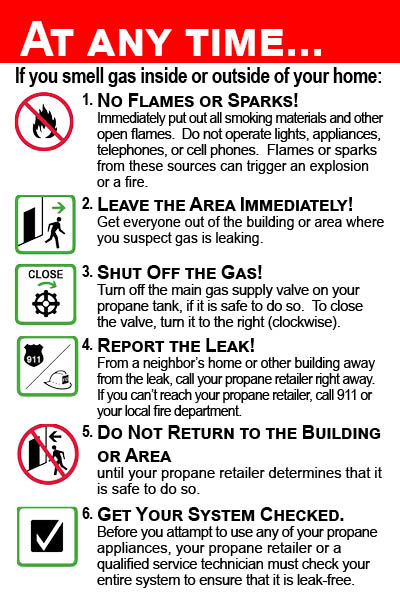Be Prepared For Floods Before They Happen
- Have an adequate supply of propane in your tank. During and after a hurricane, propane and other types of fuel may not be readily available and roads leading to your home or farm might not be accessible for delivery.
- Know how and where to shut off the outdoor propane supply and indoor propane appliances. For more information, contact your propane retailer.
- In flood zone areas, the National Fire Protection Agency (NFPA) requires that large above-ground and underground propane tanks be anchored securely to avoid potentially dangerous situations. Contact your propane retailer for more information.
- MAKE SURE that YOU AND YOUR FAMILY KNOW WHAT PROPANE SMELLS LIKE. Propane has a strong, unpleasant
smell like rotten eggs, a skunk’s spray, or a dead animal. - NEVER store or place a propane cylinder indoors or in an enclosed area such as a basement, garage, shed, or tent.
- It is recommended that you consider installing a carbon monoxide (CO) detector listed by Underwriters Laboratories (UL) on every level of your home. Be sure to follow the manufacturer’s instructions regarding installation, location, and maintenance.
- Propane gas detectors provide an additional measure of security. It is recommended that you consider installing one or more propane gas detectors listed by UL. Be sure to follow the manufacturer’s instructions regarding installation, location, and maintenance.
- Have a list of instructions on how to turn off electricity, propane, and water. Review suggested preparations for natural disasters such as hurricanes with your propane retailer as well as other utility suppliers. Advise them of any special needs you may have.
- Create an emergency preparedness plan and review it regularly with your family in order to keep them safe during a potential disaster.
If a hurricane threatens your safety, you may have to decide whether or not it is necessary to evacuate your home or farm. Listen to your local authorities, or television and radio stations, for instructions on the appropriate course of action to take. Whether it is determined that you should stay or leave, you should shut off your gas.
Shut off the gas!
- Turn off the main gas supply valve on your propane tank, if it is safe to do so. To close the valve, turn it to the right (clockwise).
- Turn off the gas supply valves located near individual indoor appliances. Consult your propane retailer to make sure you know where the actual valves are located and how to shut them off.
If your gas comes from a metered pipe system, consult your propane retailer on how to shut off the gas.
What To Do After A HurricaneFloods, tornadoes, and high winds that accompany hurricanes can damage your propane equipment. A large propane tank can become dislodged from its service line and float away, striking trees, vehicles, or other heavy objects along its path. Also, water and debris can find their way inside regulators and controls, causing potential safety issues. In addition, fallen trees and power lines can create extra safety concerns. Use caution when returning to your home or farm. If you have any doubts about your safety, leave the area immediately and have your property inspected by a qualified building inspector or structural engineer before re-entering. Take the time to carefully evaluate the condition of all the structures on your property. If it is dark, use flashlights, not candles. Look carefully around the entire area. Check for downed power lines; they can create major safety hazards. High winds and floods can move, shift, or damage gas lines and tanks. Immediately call your local utility company or propane retailer if any of these hazards exist
If you find a propane tank on your property that is not yours, or if your propane tank has become dislodged or is missing, contact your propane retailer or your local fire department immediately.
Follow These General Safety RulesHurricanes can cause power outages, flooding, or other events requiring you to take additional safety measures. To help reduce the potential for injury or death, there are general safety rules that you should observe at all times:
- NEVER use outdoor propane appliances indoors or in enclosed areas. This could result in CO poisoning or death. These include
outdoor portable heaters, barbecue grills, and portable generators. Only use appliances indoors that are designed and approved for indoor use. - NEVER store or place a propane cylinder indoors or in an enclosed area such as a basement, garage, shed, or tent.
- NEVER use a gas oven or range-top burners to provide space heating.
- DO NOT UNDER ANY CIRCUMSTANCES TRY TO MODIFY OR REPAIR VALVES, REGULATORS, OR OTHER APPLIANCE PARTS.
- NEVER turn on a light switch, use any power source, or inspect your household appliances while standing in water. This can result in electrocution.
- DO inspect chimneys, flue pipes, and vent connectors for damage, blockage, or debris.
- DO inspect your propane appliances for water or other damage, if it is safe to do so. If the appliances have electric components
and have been exposed to water, they can create a fire hazard.
If you suspect any of your propane appliances, equipment, or vehicles have been under water or they have been damaged, or you
have turned off your gas supply:
- DO schedule a time for a qualified service technician to perform a complete inspection of your propane system. The technician can also perform a leak test on the system and re-light your pilot lights.
- DO NOT use or operate appliances, equipment, or vehicles, or turn on the gas supply, until your system has been inspected by a qualified service technician.

